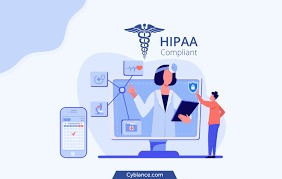The Health Insurance Portability and Accountability Act (HIPAA) since 1996 to establish national standards for protecting the confidentiality, integrity, and availability of individuals’ health information. One key aspect of HIPAA compliance is ensuring that electronic health records (EHRs) are securely stored and accessed only by authorized individuals. This is where a HIPAA compliant database comes in, providing a secure and reliable solution for managing and protecting sensitive health information. In this blog, we will explore what a HIPAA-compliant database is and why it is important.
Contents
What Are The HIPAA Compliant Databases?
HIPAA compliant databases are databases that have been designed and implemented in accordance with the Health Insurance Portability and Accountability Act (HIPAA) regulations. These databases provide a secure and reliable solution for storing and managing electronic protected health information (ePHI) in a manner that complies with HIPAA requirements.
Examples Of HIPAA Compliant Databases

Here are a few examples of HIPAA compliance platforms:
Amazon RDS
Amazon RDS (Relational Database Service) is a managed service that provides a scalable and cost-effective solution for running relational databases in the cloud. The database RDS is certified as HIPAA compliant and includes features such as data encryption, access controls, and automated backups.
Amazon EC2 And Databases
Amazon EC2 (Elastic Compute Cloud) is a web service that provides scalable computing capacity in the cloud. EC2 Amazon-based databases, such as MySQL, PostgreSQL, and SQL Server, can be configured to meet HIPAA compliance requirements by implementing security controls, encryption, and auditing capabilities.
Amazon DynamoDB
Amazon DynamoDB is a fully managed NoSQL database service that provides fast and predictable performance with seamless scalability. It is also HIPAA compliant and provides features such as data encryption, access controls, and automated backups.
Overall, it is important to note that while these databases are certified as HIPAA compliant. This is still the responsibility of the healthcare organization to ensure that they are configured and used in a manner that meets all relevant HIPAA regulations.
Benefits Of Choosing A Database With HIPAA Compliance
Choosing a database with HIPAA compliance can provide several benefits for healthcare organizations, including:
- Security: Firstly, HIPAA compliant databases are designed with security in mind and include features. For instance data encryption, access controls, and auditing capabilities. These features help to protect sensitive health information from unauthorized access, disclosure, or modification.
- Compliance: By using a database that is certified as HIPAA compliant, healthcare organizations can ensure that they are meeting all relevant HIPAA regulations. This can help to reduce the risk of HIPAA violations and associated fines and penalties.
- Scalability: Many HIPAA compliant databases, such as Amazon RDS and DynamoDB. All of these are designed to be scalable and can easily accommodate the growing data storage. This also can be processing the needs of healthcare organizations.
- Reliability: HIPAA compliant databases typically include backup and recovery features that ensure that data is recoverable in the event of a disaster or system failure. This can help to ensure that critical health information is always available when needed.
- Cost-effectiveness: By using a managed database service that is certified as HIPAA compliant, healthcare organizations can save on the cost of building and maintaining their own HIPAA compliant database infrastructure.
In summary, using a database with HIPAA compliance can provide healthcare organizations with a secure, compliant, scalable, reliable, and cost-effective solution. This can store and manage electronically protected health information (ePHI).
HIPAA Compliance Requirements For Databases

HIPAA compliance requirements for databases include several key elements. They ensure the confidentiality, integrity, and availability of electronic protected health information (ePHI). Some of the key HIPAA compliance requirements for databases are:
- Access controls: Access controls are used to restrict access to ePHI to authorized individuals only. Databases must implement access controls to ensure that only authorized individuals can access ePHI.
- Encryption: Encryption is used to protect ePHI from unauthorized access or disclosure. Databases must implement encryption for ePHI at rest and in transit.
- Audit controls: Audit controls are used to track who has accessed ePHI and what changes have been made. Databases must implement audit controls to allow for monitoring and logging of all access to ePHI.
- Backup and recovery: Backup and recovery measures must implement. This ensures that ePHI can recover back in the event of a disaster or system failure.
- Data integrity: Data integrity measures must be implemented to ensure that ePHI is accurate, complete, and unaltered.
- Risk analysis: Risk analysis must conduct to identify and address potential risks to the confidentiality, integrity, and availability of ePHI.
- Business associate agreements: Business associate agreements must be in place with any third-party service providers that have access to ePHI.
- Security incident procedures: Procedures must be in place to identify, respond to, and mitigate security incidents involving ePHI.
Above all, these requirements are designed to ensure that ePHI is protected from unauthorized access, disclosure, or modification. It also includes healthcare organizations meeting all relevant HIPAA regulations.
Conclusion
In conclusion, HIPAA compliant databases are a secure and reliable solution for storing. It also includes managing electronically protected health information (ePHI) in a manner that complies with HIPAA regulations. By choosing a certified database as HIPAA compliant, healthcare organizations can ensure that they are meeting all relevant HIPAA requirements. This includes access controls, encryption, audit controls, backup and recovery, data integrity, risk analysis, business associate agreements, and security incident procedures. If you are looking to implement any of the Infosec compliance frameworks such as SOC 2 compliance, HIPAA, ISO 27001, and GDPR compliance, Impanix can help. Book a Free consultation call with our experts or email us at [email protected] for inquiries.
